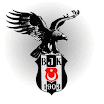
Our Logo
Our logo depicts the board for the Game of Trictrac (tric-trac , trique-traque, trick-track), one of Africa=s oldest games played with pegs (fichets), dice (dé), dice cup (cornet) and disks (jetons de bredouille). The board consists of twenty-four points (flèches), twelve on either side separated by a bar into two tables (jans) of six points. The contestants move checkers on the board, gaining points for their positions and their plays. The winner of the match (partie) is the first one who wins twelve games of twelve points each. The word trictrac is derived from the clicking sound made by the pieces during the game. The game featured two players. However, our logo depicts the pegs meant for four players as a symbol for the past players and the present ones playing together, thus expressing the fundamental purpose of the Myth Study Group which is to understand the present through the past so as to be ready to face the future. This idea is clearly expressed in our motto which is in a form of an apophthegm: Facilior progressus in regressu. (Easier progress in regression) which emphasises the need to regress in order to progress well. It is by reassessing oneself or looking back and probing one=s inner self that one can easily progress in life. This is the way athletes procede before they run a race. They first run backwards, stop to get ready to run forwards and then run the actual race. The Game of Trictrac was instituted by Thoth and was very complex in its original form. It has now been replaced by a simpler version called backgammon. The trictrac board with its twelve points on each side is obviously a symbol of the cosmos. It became widespread after its institution and was a favourite pastime for the Germanic gods who used it as a divinatory mechanism before the wars.
Thoth=s figure majestically dominates the background in the middle of our trictrac design. The image of Thoth (Tahuti, Dhouti, Tehuti, Techu, Thaut, Thout, Thouti, Zhouti) in the logo is endowed with a head of an ibis. On his head, there is a crescent moon and a lock of hair which symbolises youth. He wields a sceptre with his right hand and a cruciform emblem of life in his left hand. Thoth was a self-produced and self-begotten god who was initially the lunar god before assuming also the function of a deity of dawn. He was a multi talented figure: divine messenger, healer, inventor of letters and numbers, regenerator, scribe of the gods, regulator of time, magician, pathfinder, architect, judge etc. He was usually portrayed with a head of an ibis or a baboon which are animals that chatter to greet the dawn. Apart from his psychopompous role of conducting the souls to the netherworld, he also appeared on the tombs reading men=s deeds in order to pass judgement. His emblems were the stylus, the bear, the ink pot, the lunar disk, the tau cross, the ankh or symbol of life, the axe, the scales etc. His name is probably derived from the oldest Egyptian name for the ibis, tehu. The ti was added to demonstrate that a king called Tehuti possessed the attributes of the ibis. According to certain linguists, the Old English word thoht for Athought@ is derived from Thoth. He was the master of writing, languages, laws, annals, calculations etc. and the patron of scribes, scholars and magicians.
As a group of young scholars of the rainbow nation that has just emerged from its chrysalis, aspiring to understand the world as it was in the past and how it looks today, it seemed appropriate to adopt, as our insignia, the trictrac which symbolises the intricacies of the world and the African deity (our ancestor) as the patron of our intellectual venture for knowledge, writing, etc. As the Italian puts it in his broken Latin: Chi va piano, va sano, chi va sano va lontano (He who walks slowly walks safely, he who walks safely will go far), we hope to get there...
Logo conceived by SH Madondo and Designed by Elsabe Viljoen(UNISA Press).
Reference:http://www.unisa.ac.za/Default.asp?Cmd=ViewContent&ContentID=18453














0 yorum:
Post a Comment